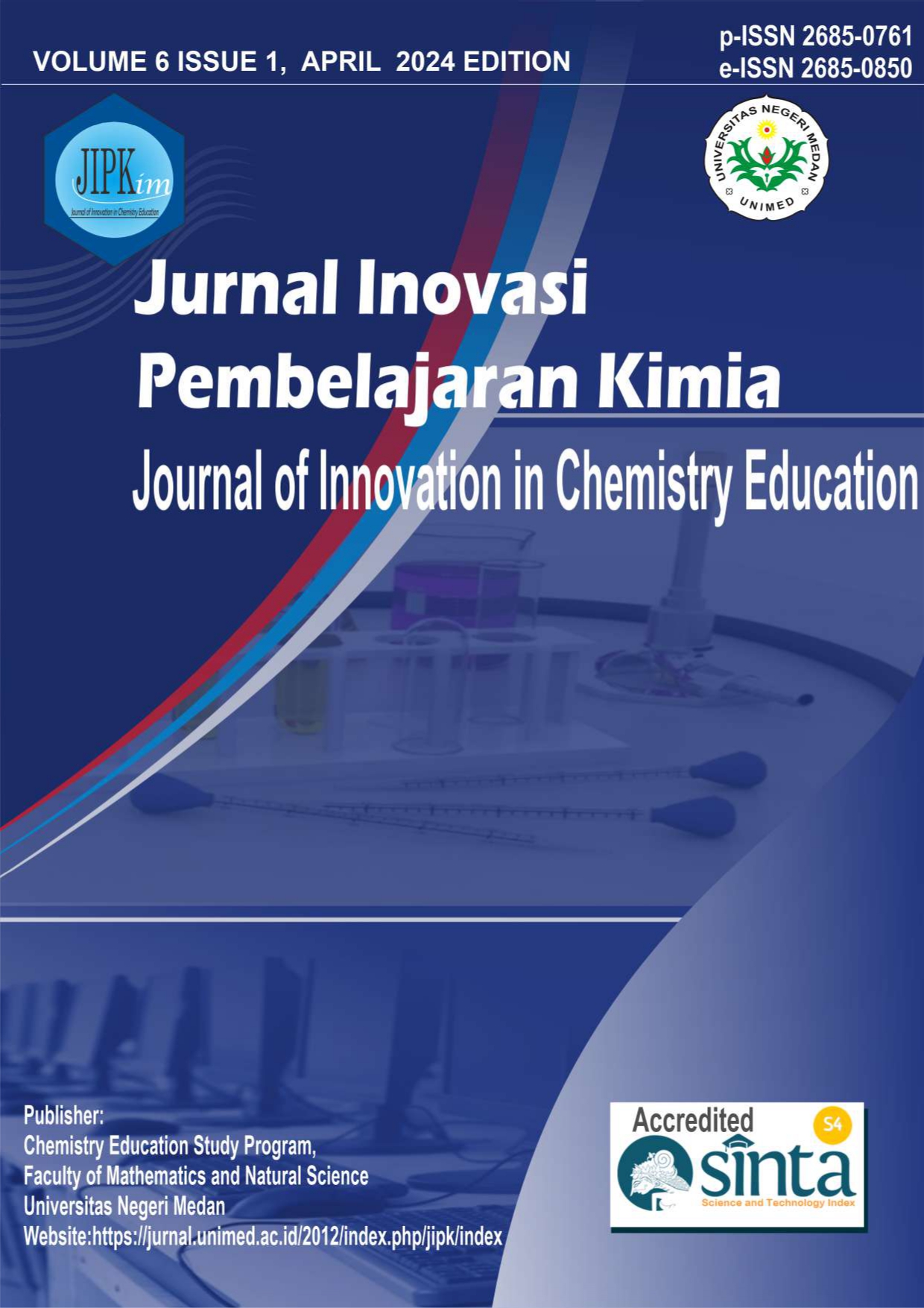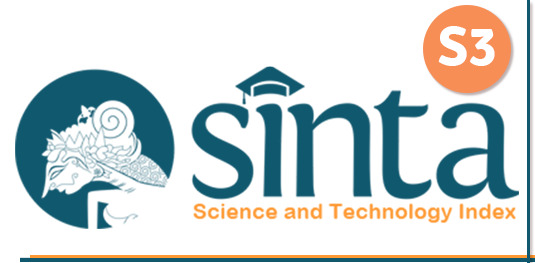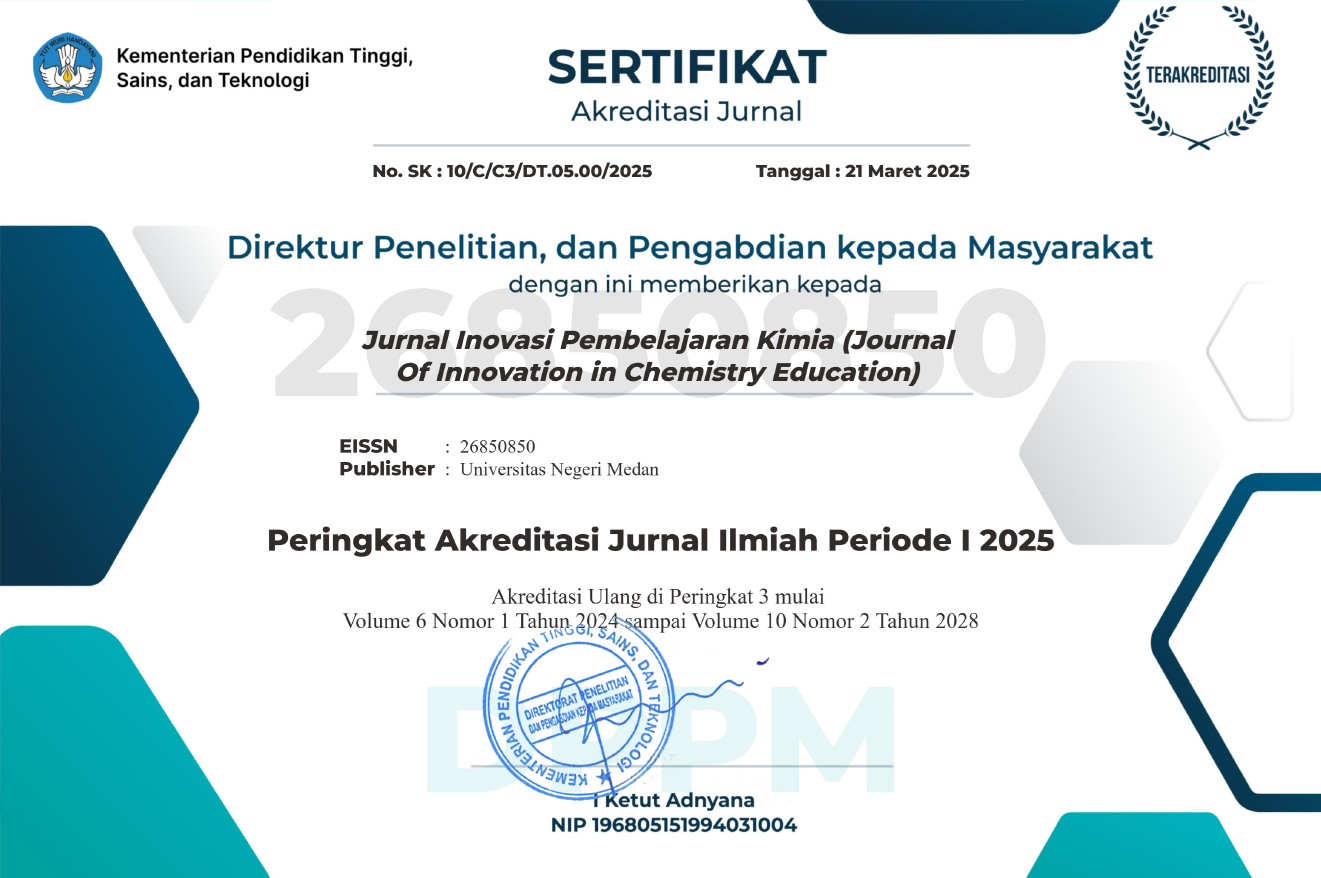The Influence of the Problem Based Learning Model on Student Interest and Learning Outcomes
DOI:
https://doi.org/10.24114/jipk.v6i1.57279Keywords:
Problem Based Learning, Learning Outcomes, Interest to Learn, Reaction RateAbstract
This research aims to (1) determine the effect of using the Problem Based Learning model on student learning outcomes in reaction rate material (2) knowing the effect of using models Problem Based Learning on students' learning interest in reaction rate material. The population of this study were all students of class XI MIPA SMAN 14 Medan. The sampling technique was carried out random sampling, namely class XI MIPA 3 as an experimental class with 34 students. The results obtained are the average value of the experimental data class pretest and posttest is 37.50 and 79.85, which means it is higher than the minimum completeness criteria (KKM) value, namely 75. Data from the normality and homogeneity tests obtained normal distribution and homogeneous data. The results of the hypothesis test were carried out using one sample t-test at the significance level α = 0.05, earned value tcount 2.403 > ttable 1.692 with sig. (2 tailed) 0.022 < α = 0.05 so Ha is accepted and H0 is rejected. Students' interest in learning in the experimental class obtained an average score of 77.02 with high criteria of 47.1% and medium criteria of 52.9%.References
Ansori, I., Endang, B., & Yusuf, A. (2017). Analisis Faktor-Faktor Penyebab Rendahnya Prestasi Belajar Pada Siswa Kelas Viii Sekolah Menengah Pertama. Jurnal Pendidikan Dan Pembelajaran Khatulistiwa, 5(10), 1“10.
Asvifah, F. F., & Wahjudi, E. (2019). Penerapan Model Pembelajaran Problem Base Learning (PBL) Untuk Meningkatkan Hasil Belajar Siswa Kelas XI Akuntansi Pada Materi Pelajaran Akuntansi Keuangan di SMK Negeri 1 Sooko Mojokerto. Jurnal Pendidikan Akuntansi, 07(3), 460“465.
Badariah, B., Pristiwanti, D., & Rosmilawati, I. (2022). Pemanfaatan Permainan Tradisional Bola Bekel dalam Meningkatkan Motivasi dan Hasil Belajar Siswa. Journal on Teacher Education, 4(2), 1252“1259. http://journal.universitaspahlawan.ac.id/index.php/jote/article/view/10001%0Ahttp://journal.universitaspahlawan.ac.id/index.php/jote/article/download/10001/7989
Basri, H. (2013). Foundations of Education.Bandung: Pustaka Setia
Hayun, M., & Syawaly, A. M. (2019). Pengaruh Penerapan Model Pembelajaran Problem Based Learning Tehadap Kemampuan Representasi Matematis Siswa Sekolah Dasar. Jurnal Instruksional, 2(1), 10“16. https://doi.org/https://doi.org/10.24853/instruksional.2.1.10-16
Hotimah, H. (2020). Penerapan Metode Pembelajaran Problem Based Learning Dalam Meningkatkan Kemampuan Bercerita Pada Siswa Sekolah Dasar. Jurnal Edukasi, 7(3), 5. https://doi.org/10.19184/jukasi.v7i3.21599
Hsu, C.-S., Yen, S.-H., & Lai, W.-H. (2016). The Effect of Problem-Based Learning on Learning Outcomes of Accounting Students. Asian Journal of Finance & Accounting, 8(2), 135-154.
Juita, F., & Yulhendri, Y. (2019). The Influence of Numerical Ability and Question Practice Intensity on Learning Results for Number Processing Applications (Spreadsheets).Ecogen Journal, 2(4), 832. https://doi.org/10.24036/jmpe.v2i4.7860
Kartika, S., Husni, H., & Millah, S. (2019). Pengaruh Kualitas Sarana dan Prasarana terhadap Minat Belajar Siswa dalam Pembelajaran Pendidikan Agama Islam. Jurnal Penelitian Pendidikan Islam, 7(1), 113-126.
Narmaditya, B., Winarning, W., & Wulandari, D. (2017). Impact of Problem Based Learning on Student Achievement in Economics Course. Classroom Action Research Journal, 1(1), 1-11.
Nisak, C., & Sari, A. R. (2013). Application of the Problem Based Learning Model to Improve Accounting Learning Activities and Achievement. Indonesian Journal of Accounting Education, 11(1), 82-99.
Nurhasanah, S., & Sobandi, A. (2016). Minat belajar sebagai determinan hasil belajar siswa. 1(1), 128“135.
Nurrita, T. (2018). Kata Kunci : Media Pembelajaran dan Hasil Belajar Siswa. 03, 171“187.
Panggabean, F. T. M., Silitonga, P. M., & Sinaga, M. (2022). Development of E-Modules to Improve Students™ High Order Thinking Skills. AIP Conference Proceedings, 2659(November). https://doi.org/10.1063/5.0114397
Pasiri, Y. (2023). Pengaruh Penggunaan Model Problem Based Learning Terhadap Kemampuan Literasi Sains Siswa. Jurnal Pendidikan Dan Pembelajaran, 3(2), 94“101. https://doi.org/10.62388/jpdp.v3i2.336
Priliyanti, A., Muderawan, I. W., & Maryam, S. (2021). Analisis Kesulitan Belajar Siswa Dalam Mempelajari Kimia Kelas Xi. Jurnal Pendidikan Kimia Undiksha, 5(1), 11. https://doi.org/10.23887/jjpk.v5i1.32402
Purba, E., & Munzirwan, R. (2022). Penerapan model pembelajaran problem based learning terhadap hasil belajar dan minat siswa pada materi laju reaksi di SMA Katolik Medan XI IPA 4. Educenter : Jurnal Ilmiah Pendidikan, 1(6), 701“706.
Rasyid, R., Anwar, M., & Musdalifah, M. (2022). Penerapan Model PBL Untuk Meningkatkan Hasil Belaja Peserta Didik Pada Materi Kesetimbangan Kimia. Jurnal Pendidikan Dan Profesi Keguruan, 2(1), 85“90.
Roza, M. H., & Damanik, M. (2022). Pengaruh Model PBL Terhadap Keaktifan Siswa dan Hasil Belajar Kimia SMA/MA pada Materi Koloid. Jurnal Inovasi Pembelajaran Kimia (Journal Of Innovation in Chemistry Education), 4(2), 157-166. https://doi.org/10.24114/jipk.v4i2.36101
Safari. (2003). Learning Interest Indicator. Jakarta: Rineka Cipta.
Saragi, L., & Dalimunthe, M. (2022). Pengaruh model pembelajaran problem based learning dengan menggunakan powerpoint terhadap hasil dan minat belajar siswa pada materi laju reaksi di kelas XI SMA. Educenter : Jurnal Ilmiah Pendidikan, 1(4), 353“361. https://doi.org/10.55904/educenter.v1i4.108
Sugiyono. (2015). Metode Penelitian Pendidikan;Pendekatan Kuantitatif, Kualitatif Dan R&D. ALFABETA.
Zakiyah, H., & Ulfa, N. (2018). Pengaruh Model Pembelajaran Pbl (Problem Based Learning) Terhadap Hasil Belajar Siswa Pada Materi Bahan Kimia Dalam Kehidupan Sehari-Hari. Lantanida Journal, 5(2), 106. https://doi.org/10.22373/lj.v5i2.2833













